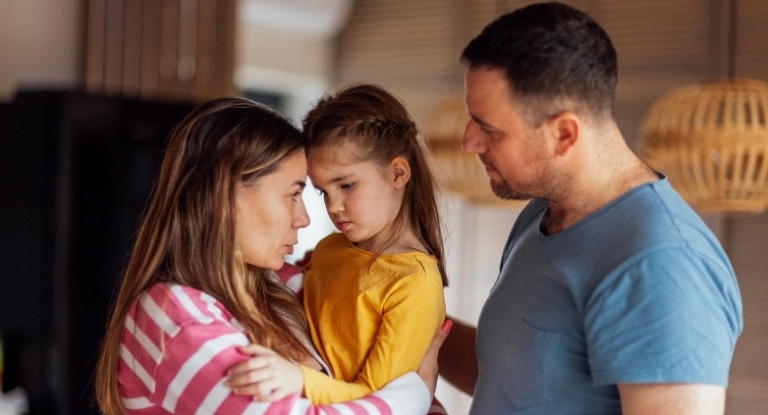
Children of Alcoholic Parents – What Families Need to Know
Growing up with an alcoholic parent can deeply affect a child’s emotional and psychological well-being. In Connecticut, where over 11 million children are impacted by alcohol use disorder (AUD) in 2026, it’s crucial to understand the long-term emotional challenges and how families can play an essential role in the healing process.
Children of alcoholic parents often experience instability, neglect, and confusion, which can lead to anxiety, depression, and behavioral issues that persist well into adulthood.
According to the National Institute on Alcohol Abuse and Alcoholism (NIAAA), children of alcoholic parents are at a higher risk for a range of emotional and behavioral challenges. They often face instability, neglect, and confusion—experiences that can affect their well-being for years to come.
Understanding these effects is the first step toward healing.
These children frequently struggle with feelings of shame, anxiety, and depression, which can lead to behavioral issues and difficulties in forming healthy relationships later in life.
Helping children of alcoholic parents involves not only addressing these emotional scars but also providing the right support to guide them toward a healthier, more balanced life.
These children often struggle with feelings of shame, guilt, and neglect, which can have lasting effects on their well-being.
Here is what we cover:
- Understanding the Impact of Alcoholism on Children
- Common Emotional and Behavioral Effects of Growing Up with an Alcoholic Parent
- Long-Term Effects of Growing Up with an Alcoholic Parent
- The Struggles of Adult Children of Alcoholics
- How Children of Alcoholics Can Heal and Recover
- How to Support Children of Alcoholic Parents
- Local Connecticut Programs & Resources
- Preventing the Cycle of Addiction
- Support Networks and Local Resources in Connecticut for Families
- FAQs
- Conclusion
Real people. Real support.
Seeking Help for Yourself or a Loved One?
Connect with our professionals to start the journey to recovery.
Call 860.388.9656 for immediate support.
This article will explore the effects of growing up with an alcoholic parent, the emotional challenges these children face, and how families in Connecticut can support healing. Through therapy, local support groups, and guidance, children of alcoholics can learn to break the cycle and build a healthier future.
Let’s dive deeper into the impact of alcohol use disorder on children and the healing paths available in Connecticut in 2026.

1. Understanding the Impact of Alcoholism on Children
Alcohol abuse in the home creates an environment of instability that directly impacts a child’s emotional and psychological development. In Connecticut, children growing up in homes with alcohol use disorder (AUD) often face neglect, emotional instability, and a lack of structure.
This chaotic environment leads to confusion, fear, and insecurity, which can have long-term consequences.
Key Emotional Impacts Include:
- Emotional Instability: Children may feel abandoned or ignored, leading to confusion about their place in the family.
- Neglect: Children may not receive the emotional nurturing they need, which stunts their emotional development.
- Unhealthy Family Dynamics: Addiction in the family often causes communication breakdowns, leaving children unable to express their feelings or receive proper support.
According to the National Institute on Alcohol Abuse and Alcoholism (NIAAA), children living in homes with alcohol abuse are at a higher risk for emotional and behavioral issues that persist well into adulthood.
For more details on how alcohol abuse impacts family dynamics, visit How Alcoholism Affects Family Dynamics.

2. Common Emotional and Behavioral Effects of Growing Up with an Alcoholic Parent
Children of alcoholic parents frequently carry emotional scars into adulthood. The emotional consequences can range from feelings of shame and guilt to severe anxiety and depression. These feelings often manifest in behavioral issues, leading to challenges in forming healthy relationships and maintaining stability.
Common Emotional Struggles:
- Shame and Guilt: Children may internalize their parents’ addiction, wrongly believing they are responsible for their parent’s behavior.
- Perfectionism and Anxiety: A desire to “fix” the family or achieve perfection becomes a coping mechanism, leading to anxiety and stress.
- Depression: The overwhelming emotional pain from living in an alcoholic household often results in sadness and hopelessness.
Behavioral Issues Include:
- Acting Out: Children may act out in anger or aggression to release built-up frustration.
- Social Isolation: A lack of emotional security can make it hard for children to trust others, leading to withdrawal from friends and family.
These emotional and behavioral consequences can affect children’s well-being well into their adult lives. For more on how therapy can help children address these issues, read The Role of Family Therapy in Addiction Recovery.
3. Long-Term Effects of Growing Up with an Alcoholic Parent
The trauma of growing up with an alcoholic parent can continue to affect individuals well into adulthood. Children of alcoholics are at a higher risk for developing mental health disorders, including anxiety, depression, and even addiction themselves.
Increased Risk of Addiction:
Children exposed to alcohol abuse are more likely to develop substance use disorders later in life due to both genetic and environmental factors. They may repeat the cycle of addiction, perpetuating the negative effects of alcoholism across generations.
Mental Health Struggles Include:
- Anxiety and Depression: These children are more prone to experiencing long-term emotional struggles like chronic sadness and excessive worry.
- Post-Traumatic Stress Disorder (PTSD): Children may develop PTSD due to the constant stress and emotional turmoil from living in a chaotic home environment.
To better understand how addiction in the family shapes mental health, explore Addiction is a Family Disease.
Free Download
Proven Programs for Lasting Recovery
Receive your free guide to understanding alcohol addiction and discovering recovery programs tailored to you. Learn how to build a personal sobriety plan and get support every step of the way.
4. The Struggles of Adult Children of Alcoholics
The effects of growing up with an alcoholic parent do not disappear when children become adults. Many adult children of alcoholics (ACoAs) continue to face challenges rooted in childhood trauma, affecting their emotional, psychological, and relational health.
Common Struggles Include:
- Hypervigilance: Many ACoAs are overly sensitive to potential threats, a result of growing up in an unpredictable environment.
- A Need for Control: The desire to control their surroundings stems from a childhood where unpredictability was a constant challenge.
- Emotional Suppression: Many ACoAs find it difficult to express emotions, whether positive or negative, leading to emotional disconnection and challenges with intimacy.
Long-Term Relationship Struggles:
- Low Self-Esteem: Neglect or emotional absence during childhood can create ongoing issues with self-worth.
- Repeating Cycles: ACoAs are at a higher risk of choosing partners with substance use problems, perpetuating the cycle of addiction.
Understanding and addressing these challenges is crucial for adult children to break free from the patterns learned in childhood. For more on overcoming these challenges, check out Families in Recovery.
5. How Children of Alcoholics Can Heal and Recover
Healing from the trauma of growing up with an alcoholic parent is a long-term process that requires both emotional work and external support. Therapy, self-awareness, and a supportive community are key to recovery.
Steps Toward Healing:
- Therapy and Counseling: Professional therapy helps children of alcoholics process their emotions and develop healthier coping strategies. It is essential for individuals to understand the long-term effects of alcohol use disorder and learn how to break the cycle.
- Support Groups: Joining support groups for children of alcoholics provides a sense of community. Group therapy fosters healing by allowing individuals to connect with others who understand their experiences.
- Building Healthy Relationships: With the right support, individuals can rebuild their self-esteem, learn to trust, and form meaningful relationships.
Project Courage offers tailored therapy programs in Connecticut for individuals and families affected by alcoholism. Explore our Programs to begin your healing journey today.

6. How to Support Children of Alcoholic Parents
Supporting children of alcoholic parents requires a compassionate, understanding approach. Creating a stable, nurturing environment is essential for helping them heal from the trauma of addiction.
Key Ways to Support Children:
- Provide Emotional Stability: Show love, care, and consistent support to help children feel secure.
- Encourage Open Communication: Let children express their feelings freely, without fear of judgment. This helps foster trust and emotional well-being.
- Guide Them Toward Professional Help: Encourage children to seek therapy or support groups. Community organizations like Al-Anon can also provide invaluable support for families affected by alcohol abuse.
Supporting children of alcoholic parents in Connecticut means offering them the resources and care they need to heal and grow. For more information on supporting a child in recovery, visit Support Groups for Families of Addicts.
Real people. Real support.
Seeking Help for Yourself or a Loved One?
Connect with our professionals to start the journey to recovery.
Call 860.388.9656 for immediate support.
Local Connecticut Programs & Resources
If you are seeking support for a child affected by alcohol abuse in Connecticut, there are resources available to help. Project Courage offers personalized therapy programs tailored to the needs of children from families affected by alcoholism. Our comprehensive approach focuses on healing emotional trauma, rebuilding trust, and promoting long-term recovery.
In addition to therapy, local Al-Anon meetings and family therapy services are available across Connecticut to support individuals and families impacted by alcohol abuse.
For more information, visit Project Courage’s Contact Page.

Preventing the Cycle of Addiction: How Connecticut Families Can Break the Pattern
Breaking the cycle of addiction requires awareness, intervention, and a commitment to change.
Families in Connecticut can take steps to help their children avoid repeating the patterns of addiction by fostering healthy relationships, building resilience, and seeking early intervention.
Steps for Preventing the Cycle of Addiction in Connecticut Families:
- Early Intervention: The earlier addiction is addressed in a family, the better the chances of preventing long-term effects. If you notice signs of substance abuse in a loved one, don’t wait for the problem to escalate. Seek help through local resources like Project Courage or Al-Anon to intervene early and prevent further damage.
- Family Therapy: Family therapy is a crucial tool for breaking the cycle of addiction. By addressing dysfunctional patterns and building healthy communication, therapy can help families rebuild trust, set boundaries, and heal from past trauma. Many programs in Connecticut, including those offered by Project Courage, focus on helping families navigate these complex dynamics and break free from cycles of addiction.
- Education and Awareness: Knowledge is power when it comes to addiction. Understanding the warning signs of addiction and the genetic and environmental factors that contribute to it can empower families to take action before things get out of control. Educational programs and support groups are a great way to keep families informed and proactive.
- Building Emotional Resilience: One of the most important things you can do as a family is to build emotional resilience. Encourage open communication, provide emotional support, and work together to create a healthy, stable environment for everyone. Resilience helps families cope with the challenges of addiction and recover from setbacks.
Preventing addiction in future generations is possible when families work together, seek help, and are committed to making positive changes.
With the right support, families in Connecticut can break the cycle of addiction and create a healthier, more hopeful future.
For more information on our family-centered therapy programs, contact Project Courage today.
Support Networks and Local Resources in Connecticut for Families
Supporting children of alcoholic parents requires not only understanding the impact but also accessing local resources that can make a difference.
In Connecticut, there are many support networks and community programs designed to help families heal and break free from the cycle of addiction.
Key Local Resources for Families in Connecticut:
- Project Courage’s Child Support Program: A comprehensive, family-centered therapy program aimed at helping children of alcoholics process emotional trauma and build healthier coping mechanisms. Our therapists work with both children and parents to foster communication and emotional healing. Contact Project Courage for more information.
- Connecticut Al-Anon Family Groups: Al-Anon offers support to families affected by someone else’s drinking. With meetings throughout Connecticut, it provides a safe space for families to share experiences and gain strength from others who understand their struggles. For more information, visit Al-Anon Connecticut.
- Connecticut Department of Mental Health and Addiction Services (DMHAS): DMHAS provides resources for families dealing with alcohol addiction, including counseling services, recovery support, and prevention programs. Learn more about their services on the DMHAS wcebsite.
- Narcotics Anonymous (NA): While focused on addiction recovery, NA also provides support for families of addicts through meetings that help individuals understand addiction’s impact on loved ones. For information on local meetings, visit Narcotics Anonymous – Connecticut Region.
These resources help families in Connecticut navigate the challenges of living with alcohol addiction and provide avenues for healing and recovery. It’s essential to reach out and access the support that works best for your situation.
FAQs
Healing starts with acknowledging the trauma and seeking professional help. Therapy, support groups, and a stable, loving environment are crucial for overcoming the emotional scars.
Yes, children of alcoholic parents are more likely to develop addiction due to genetic factors and learned behaviors from growing up in an unstable environment.
Listen empathetically, avoid judgment, and encourage them to seek therapy or support groups. Consistent emotional support is key.
Yes, family therapy can help rebuild trust, improve communication, and address the trauma caused by living in an alcoholic household.
Free Download
Proven Programs for Lasting Recovery
Receive your free guide to understanding alcohol addiction and discovering recovery programs tailored to you. Learn how to build a personal sobriety plan and get support every step of the way.
Conclusion
Understanding the effects of growing up with an alcoholic parent is essential for providing the right support to those affected. The emotional scars, neglect, and instability children face require professional help, a stable environment, and love from those around them.
Through therapy, support groups, and emotional healing, children of alcoholics can break the cycle of addiction and build a brighter future.
If you or a loved one needs support, Project Courage offers family-centered therapy programs in Connecticut to help children affected by alcohol abuse heal and thrive. Contact us today to begin the healing journey.
Are you or someone you love struggling with the effects of growing up with an alcoholic parent?
Project Courage in Connecticut offers personalized therapy programs to support children and families. Contact us now to begin the healing journey.


